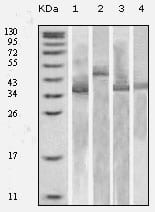
| WB | 1/500 - 1/2000 | Tag |
| IF | 咨询技术 | Tag |
| IHC | 1/100 - 1/1000 | Tag |
| ICC | 1/100-1/200 | Tag |
| FCM | 1/200 - 1/400 | Tag |
| Elisa | 1/10000 | Tag |
| Aliases | Thioredoxin |
| clone | 1H6H6 |
| WB Predicted band size | 12kDa |
| Host/Isotype | Mouse IgG1 |
| Antibody Type | Tag Antibody |
| Storage | Store at 4°C short term. Aliquot and store at -20°C long term. Avoid freeze/thaw cycles. |
| Species Reactivity | Tag |
| Immunogen | Purified recombinant fusion protein with Thioredoxin (TRX) tag. |
| Formulation | Ascitic fluid containing 0.03% sodium azide. |
+ +
1. **"Production and characterization of antibodies against human thioredoxin"** by Nakamura et al. (1996)
- 摘要:该研究描述了针对人源硫氧还蛋白(TRX)的多克隆和单克隆抗体的制备及特性分析,验证了抗体在Western blot和免疫组化中的特异性,并用于检测细胞和组织中TRX的表达水平。
2. **"Thioredoxin overexpression in transgenic mice attenuates focal ischemic brain damage"** by Takagi et al. (1999)
- 摘要:通过TRX特异性抗体检测发现,转基因小鼠中TRX的过表达显著减轻了缺血性脑损伤,表明TRX在神经保护中的作用,抗体被用于脑组织切片中TRX的定位分析。
3. **"Thioredoxin-1 expression in human gastric cancer: association with tumor progression and prognosis"** by Miyazaki et al. (1998)
- 摘要:使用TRX抗体对胃癌组织进行免疫组化分析,发现TRX-1的高表达与肿瘤侵袭性增强和患者预后不良相关,揭示了TRX在癌症进展中的潜在作用。
4. **"A novel ELISA for human thioredoxin using monoclonal antibodies"** by Jikimoto et al. (2002)
- 摘要:开发了一种基于单克隆抗体的高灵敏度ELISA方法,用于定量检测血清和细胞培养液中的TRX水平,验证了其在炎症和氧化应激相关疾病研究中的应用价值。
Thioredoxin (TRX) is a small, evolutionarily conserved redox-active protein (approximately 12-14 kDa) that plays a pivotal role in maintaining cellular redox homeostasis. It functions as a key antioxidant by catalyzing the reduction of disulfide bonds in target proteins via its conserved CXXC active site. TRX is involved in critical cellular processes, including DNA synthesis, apoptosis regulation, and defense against oxidative stress by interacting with molecules like thioredoxin reductase and NADPH. Dysregulation of TRX expression or activity has been linked to various diseases, such as cancer, neurodegenerative disorders, and cardiovascular conditions, making it a significant focus in biomedical research.
TRX antibodies are essential tools for detecting and quantifying TRX protein levels in experimental settings. These antibodies are widely used in techniques like Western blotting, immunohistochemistry (IHC), and immunofluorescence (IF) to study TRX's spatial and temporal expression across tissues or cell lines. They also aid in exploring post-translational modifications, protein-protein interactions, and subcellular localization of TRX isoforms (e.g., TRX-1 in the cytoplasm/nucleus and TRX-2 in mitochondria). Commercial TRX antibodies are typically raised in rabbits or mice against specific epitopes, with validation across species like humans, mice, and rats. Recent studies also utilize TRX antibodies to investigate its role as a potential biomarker or therapeutic target, particularly in diseases associated with oxidative stress. Their specificity and sensitivity remain critical for elucidating TRX's multifaceted roles in health and disease.
×